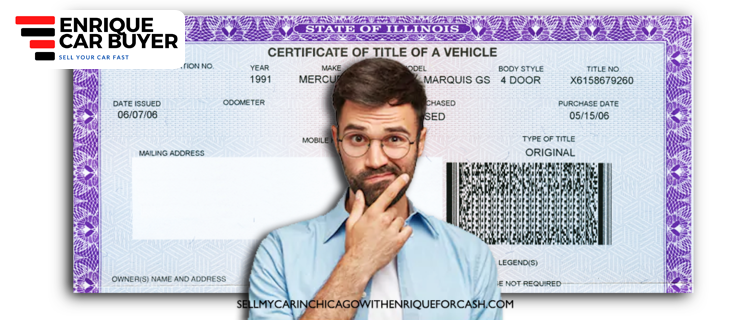What is Title Jumping: Risks & Prevention in Vehicle Sales
Title jumping, also known as title skipping or floating, is when a seller doesn’t transfer the title into their name before selling the vehicle. This illegal practice can lead to complications for the new buyer, as they may not be able to register the car with the DMV.
To prevent title jumping, buyers should ensure that the seller properly transfers the title before completing the purchase. Title jumping can create a host of issues for both buyers and sellers, including legal repercussions and difficulties with vehicle registration. In this blog, we will delve deeper into what title jumping entails, the potential consequences of engaging in this practice, and how to protect yourself from falling victim to title jumping schemes.
Understanding the risks associated with title jumping is crucial for anyone involved in buying or selling vehicles.
Title Jumping Explained
When it comes to buying or selling a vehicle, it is crucial to understand the concept of title jumping. This practice, also known as title skipping or floating, occurs when a person sells a vehicle without transferring the title into their name. Title jumping is illegal and can lead to various complications for both buyers and sellers.
The Basic Concept
Title jumping, also referred to as title skipping or floating, is the illegal practice of selling a vehicle without transferring the title into the seller’s name. This can occur when a seller acquires a vehicle and then sells it without registering the vehicle in their name, thereby avoiding the payment of sales tax and bypassing the official title transfer process.
Common Terms And Synonyms
Title Jumping: The act of selling a vehicle without transferring the title into the seller’s name.
Title Skipping: Another term for title jumping, referring to the practice of skipping the legal title transfer process.
Floating Title: This is when a vehicle’s title is not transferred into the seller’s name before being sold to another party.

Credit: suretysolutions.com
Legal Implications
Title Jumping, also known as title skipping or floating, occurs when a vehicle is sold without transferring the title to the buyer’s name. This illegal practice can prevent the new owner from registering the car with the DMV. To avoid title jumping issues, buyers should ensure proper title transfer to protect themselves legally.
Legal Implications of Title Jumping Title jumping, also known as title skipping or floating, refers to the illegal act of selling a vehicle without transferring the title into the seller’s name. This practice is illegal in every state and can have severe legal consequences for both the buyer and seller. In this section, we will discuss the legal implications of title jumping in detail, including state laws and penalties and federal regulations. State Laws and Penalties State laws regarding title jumping vary, but in general, it is considered a misdemeanor offense and can result in fines, impoundment of the vehicle, and even jail time. For example, in California, title jumping is considered a criminal offense, and individuals found guilty of title jumping can face fines of up to $1,000 and six months in jail. In Illinois, title jumping can result in a fine of up to $10,000. It is important to note that even if the seller did not intend to deceive the buyer, title jumping is still illegal, and both parties can be held liable. Federal Regulations In addition to state laws, there are also federal regulations that govern the transfer of vehicle titles. The Federal Trade Commission (FTC) requires that sellers provide buyers with a written disclosure of the vehicle’s history, including any previous damage, repairs, or title problems. Failure to disclose this information can result in legal action against the seller. It is crucial to ensure that the title is properly transferred into your name when buying or selling a vehicle. If you suspect that the seller has engaged in title jumping, you should contact the DMV and request a bonded title. This can protect you from any legal issues related to the title, allowing you to apply for a clean title of ownership. In conclusion, title jumping is a serious offense that can have severe legal consequences for both the buyer and seller. It is essential to follow state laws and federal regulations regarding the transfer of vehicle titles to avoid any legal issues.Why Title Jumping Occurs
People title jump for various reasons, primarily to avoid paying sales tax and dodging responsibility. It is illegal in all states to skip the title process.
Avoiding Sales Tax
Some individuals engage in title jumping to bypass paying sales tax on a vehicle. By not registering the vehicle in their name, they attempt to evade this financial obligation.
Dodging Responsibility
Title jumping also allows individuals to shirk their responsibility in the ownership transfer process. By skipping title registration, they avoid the legal requirements that come with owning a vehicle.

Credit: www.youtube.com
Risks For Buyers
When it comes to title jumping, buyers face a myriad of risks that can lead to significant issues down the road. From registration challenges to potential legal consequences, the implications of title jumping for buyers are substantial and should not be taken lightly.
Registration Challenges
Buyers who unknowingly purchase a vehicle with a jumped title may encounter registration challenges when attempting to transfer ownership. The DMV typically requires a clean and properly assigned title to complete the registration process. Without a valid title in the seller’s name, buyers may find themselves unable to register the vehicle in their own name, leading to a bureaucratic nightmare and potential legal repercussions.
Potential Legal Consequences
Aside from the administrative hurdles, buyers involved in title jumping may also face potential legal consequences. Title jumping is considered illegal in every state, and knowingly engaging in this practice can result in fines, penalties, and even legal action. Additionally, buyers may find themselves held liable for any outstanding taxes, fees, or penalties associated with the vehicle due to the improper transfer of title.
Risks For Sellers
When it comes to title jumping, sellers face a myriad of risks that can have serious legal and financial implications. By understanding the specific liabilities and financial repercussions involved, sellers can make informed decisions and protect themselves from potential consequences.
Liability Issues
Title jumping can expose sellers to significant liability issues. When a seller fails to transfer the title into their name before selling a vehicle, they may be held responsible for any subsequent accidents, fines, or legal matters involving the vehicle. This could result in costly legal battles and damage to the seller’s reputation.
Financial Repercussions
Title jumping can lead to severe financial repercussions for sellers. If the new owner of the vehicle fails to properly register it or commits unlawful activities using the vehicle, the seller may be held financially accountable. Additionally, sellers may face challenges in obtaining future insurance or selling vehicles due to their involvement in title jumping.
Preventing Title Jumping
When buying a vehicle, ensure the seller’s name matches the one on the title to prevent title jumping.
Sellers should always transfer the title to the buyer’s name promptly to avoid title jumping issues.
Dealing With Jumped Titles
Title jumping occurs when a seller fails to transfer a vehicle title before selling it, leading to legal issues for the new owner. To prevent title jumping, always ensure the title is properly transferred to your name to avoid registration problems.
Contact the DMV for a bonded title if needed.
Dealing with Jumped Titles Title jumping, also known as title skipping or floating, is an illegal act where a person buys a vehicle but fails to transfer the title into their name before selling it to someone else. When the new buyer tries to register the car with the DMV, they are unable to do so because of the jumped title issue. In this section, we will discuss what steps to take and when to seek legal help if you encounter a jumped title situation. Steps to Take If you find yourself in a jumped title situation, there are several steps you can take to resolve the issue. First, try to contact the seller and ask them to transfer the title into their name before transferring it to you. If the seller refuses or cannot be reached, you may need to contact the DMV and request a bonded title. This allows for a period of time in which a claim can be made to the title, after which you can apply for a clean title of ownership. When to Seek Legal Help In some cases, a jumped title issue can be resolved without legal assistance. However, if you have been scammed or defrauded by the seller, it may be necessary to seek legal help. This is especially true if the seller has disappeared or cannot be located. A lawyer can help you navigate the legal system and protect your rights as a buyer. In conclusion, jumped titles can be a complicated issue to deal with, but there are steps you can take to resolve the problem. Always make sure to transfer the title into your name when purchasing a vehicle, and if you encounter a jumped title situation, don’t hesitate to take action. Whether you need to contact the seller, the DMV, or a lawyer, it’s important to act quickly to protect your investment and avoid any legal issues.State-specific Concerns
When it comes to title jumping, it’s crucial to be aware of state-specific concerns. Each state has its own regulations and penalties related to title jumping, and it’s essential to understand the nuances of this practice in different regions.
Title Jumping In California
In California, title jumping is a serious offense with significant legal repercussions. According to California law, any individual who engages in title jumping can face fines, penalties, and even criminal charges. The California Department of Motor Vehicles (DMV) strictly enforces laws related to title transfers, and individuals involved in title jumping may be subject to severe consequences.
Title Jumping In Texas
Title jumping in Texas is also a violation that can lead to severe penalties. The Texas Department of Motor Vehicles emphasizes the importance of accurate and lawful title transfers. Engaging in title jumping in Texas can result in fines, legal liabilities, and challenges in vehicle registration processes.
Real-life Scenarios
When it comes to understanding the implications of title jumping, real-life scenarios shed light on the potential pitfalls and complications that can arise. These scenarios provide valuable insights into the risks associated with title jumping and highlight the importance of adhering to legal requirements when transferring vehicle titles.
Buyer’s Experiences
Buyers often find themselves in precarious situations when dealing with title jumping. Consider a scenario where a buyer unknowingly purchases a vehicle with a jumped title. Upon attempting to register the vehicle with the Department of Motor Vehicles (DMV), they encounter insurmountable obstacles due to the discrepancies in the title history. This can lead to legal repercussions and financial losses for the buyer, underscoring the critical need for due diligence when acquiring a vehicle.
Legal Case Studies
Legal case studies offer compelling insights into the ramifications of title jumping. For instance, a legal case involving title jumping may result in protracted legal battles and substantial legal fees for all parties involved. Furthermore, individuals who engage in title jumping may face penalties and fines for violating state laws pertaining to vehicle title transfers. These case studies serve as cautionary tales, emphasizing the legal and financial perils associated with title jumping.

Credit: sellmycarinchicagowithenriqueforcash.com
Future Of Title Regulations
The future of title regulations is crucial in preventing title jumping, an illegal practice where a seller fails to transfer ownership before selling a vehicle. To avoid this issue, buyers should ensure proper documentation and verification to protect themselves and comply with the law.
The landscape of title regulations is evolving, driven by technological advancements and policy changes. Let’s delve into the future of title regulations and how these developments are shaping the industry.Technological Solutions
Innovative technologies such as blockchain and AI are revolutionizing title management. These solutions enhance transparency and security in title transfers, reducing the risk of fraud and title jumping.Policy Changes
Policy reforms are crucial in ensuring the integrity of title transactions. Stricter enforcement and updated regulations help combat title fraud, protecting both buyers and sellers in the market. By embracing technological solutions and implementing effective policy changes, the future of title regulations is poised for a more secure and streamlined title transfer process.Frequently Asked Questions
How Do You Get Around Title Jumping?
To avoid title jumping, ensure the seller transfers the title into their name before selling. If the seller has disappeared, contact the DMV for a bonded title. This allows time for a claim to be made before applying for a clean title.
Title jumping is illegal and can be prevented through proper title transfer procedures.
What Is The Definition Of Title Jumping?
Title jumping occurs when a person sells a vehicle without transferring the title to their name first. This illegal practice is also known as title skipping or floating, and it can prevent the new buyer from registering the car with the DMV.
Why Do People Title Hop?
Title hopping, also known as title jumping or skipping, is when a person buys a vehicle but doesn’t register it in their name before selling it to someone else. This is usually done to avoid paying sales tax and the actual title transfer process.
However, title hopping is illegal in every state and can lead to penalties and difficulties in registering the vehicle with the DMV.
What Is The Penalty For Title Jumping In California?
Title jumping in California is illegal. The penalty for title jumping includes fines and legal repercussions.
Conclusion
Preventing title jumping is crucial to avoid legal issues and protect yourself. Ensure proper title transfer to maintain ownership rights and avoid potential penalties. Stay informed and follow the correct procedures to safeguard your interests when buying or selling a vehicle.

